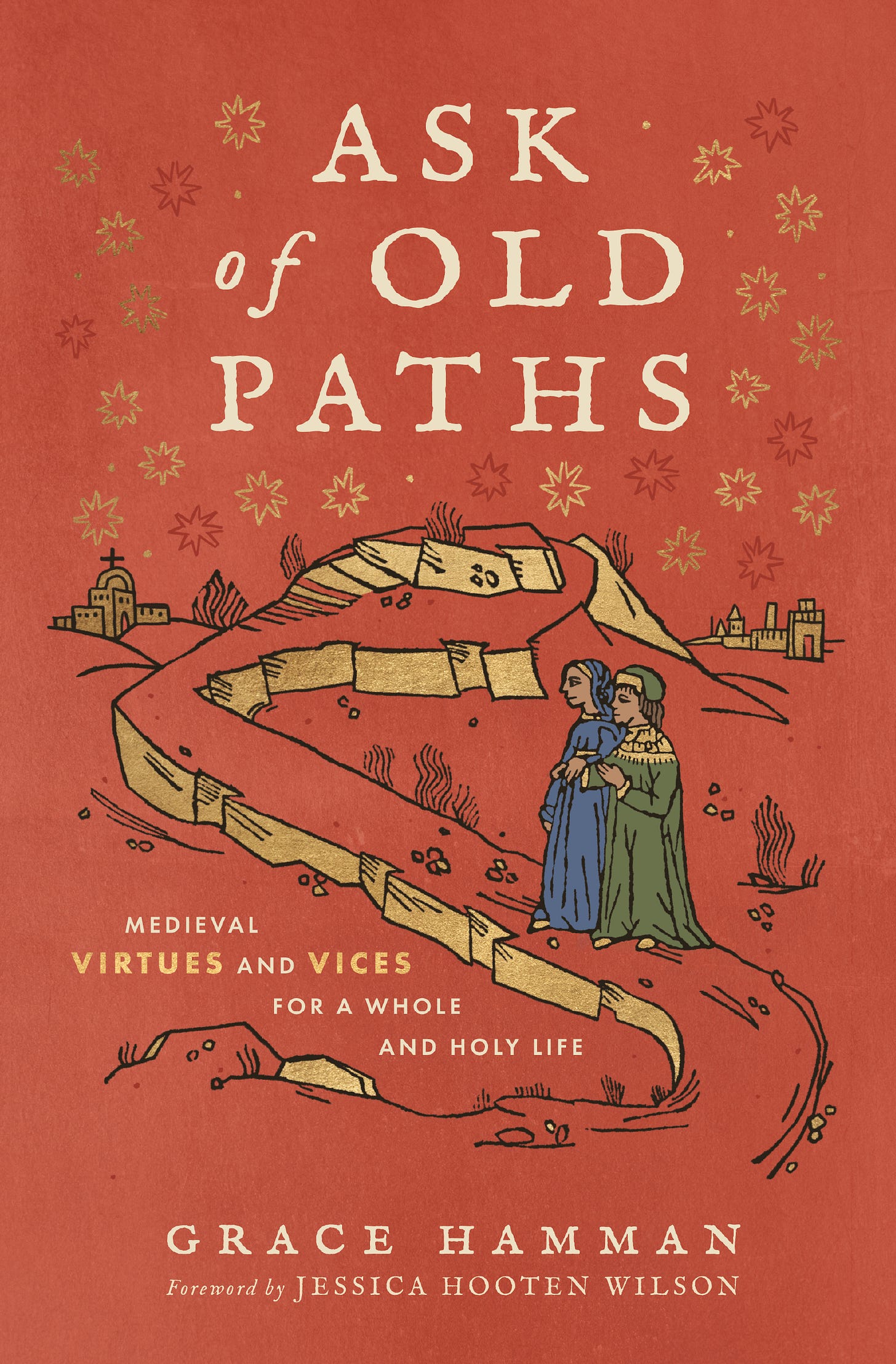Three Ancient Virtues We Need to Recover
Guest post by Grace Hamman
Guest post by Dr. Grace Hamman author of Jesus through Medieval Eyes and Ask of Old Paths: Medieval Virtues and Vices for a Whole and Holy Life.
When I was asked about three ancient virtues we need to recover in postmodernity, I wondered how I could choose. All of the remedy virtues in the long tradition of the Seven Capital Vices and their virtue remedies matter deeply to the active longing and seeking after love in the Christian life. But upon reflection, three came swimming to the top of my mind: Meekness, Fortitude, Abstinence. Despite the fact they sound a bit like flavorless joy-killers, these ancient words offer profound invitation for us as the Body of Christ in the present moment.
Meekness: Being meek has become aligned with being a doormat. Yet for medieval people, meekness had a specific purpose: it is the form of patience practiced in the face of anger.
Christians today face a unique challenge, facilitated by mass media of all kinds, of being constantly stirred up to anger. Anger itself is not a vice, but a passion, reactive feeling to something difficult. Anger has led to wellsprings of deeply needed social change, like movements for mass sanitation or child labor laws. Anger can also lead to broken relationships, war, and genocide.
It is meekness that helps us move our anger towards the one and avoid the other. To practice meekness does not mean that you are never angry. Instead, meekness, becoming patient even in anger, provides the space in the soul needed to determine whether the reaction, scale, and source of your anger is righteous or not. Meekness “deserves to be a leader,” commented one medieval pastoral guide—a rather surprising note![1] But only the meek are strong enough to refuse becoming a tool in the hands of the powerful when they are stirred up. When the anger of the meek is aroused, it is more powerful in social change than the ready, flippant anger of the furious. Meekness is a virtue for those who wish to be beacons of hope and actual movers in a frightened and angry culture.
Fortitude: This familiar word means a particular kind of courage: long-enduring courage practiced in vulnerability.
As the West becomes increasingly secularized, the Holy Spirit invites the church anew to the quiet, gentle fortitude of constancy and strength in vulnerability. We practice fortitude both in response to difficult outward circumstances, and within the heart and mind. In one of my favorite medieval images, an artist painted Lady Fortitude, standing upon a winepress, holding, of all things, a tiny castle from which she extricates a dragon![2] The castle has long been a symbol for the soul, and those who practice fortitude are called to examine and extricate all the hidden dragons in our hearts. If the church today can practice the kind of courageous, confessional self-examination and extricate the frightening monsters in our hearts and history, we will be able to love our neighbor well. That is a daunting task that requires great vulnerability.
But the winepress offers us a reminder. As we bear burdens and do the hard work of self-examination in love, we crush grapes that will one day sweeten and mature into a heady vintage. The work of fortitude is never in vain.
Abstinence: Now an unfortunate word associated with American sex-ed classrooms, the roots of abstinence are thankfully much deeper. For medieval people, abstinence was a particular kind of temperance associated with how we consume or abstain from food—or more surprisingly, language.
We in the West live in a profoundly consumeristic culture. Too often we are habituated into saying yes to every passing pleasure. We have wreaked havoc upon ecosystems by consuming this way. But we participate in gluttonous modes of language as well, in doomscrolling and news, in speaking out of our own pleasure, uncaring or even gleeful in how our words destroy the possibility of communion.
Abstinence includes the ancient Christian practice of following the liturgical year’s invitations to fasting and feasting, repentance and celebration. It emphasizes constraint because saying no is so obviously more difficult than saying yes to our pleasures. Medieval people wrote of how abstinence resembles a conversation.[3] If we are constantly talking or consuming, focused on our desires, we miss one another. We must deny ourselves at times, become quiet, submit to another’s language to receive one another in fullness. True communion with one another and creation grows in that balance between silence and speech, no and yes. Imagine how powerful it would be if the church embraced this ancient constraint, the practice of measure, in counterpoint to the devouring maw of our culture.
Grace Hamman, Ph.D. (Duke University) is a writer and scholar of late medieval poetry and contemplative writing. She is the author of Ask of Old Paths and Jesus through Medieval Eyes. Her work has been published by academic and popular outlets, including Plough Quarterly and The Journal of Medieval and Early Modern Studies. Grace hosts a podcast called Old Books with Grace which celebrates the beauty and joy found in reading the literature and theology of the past. Grace holds a doctorate in English, specializing in medieval literature and theology from Duke University. She lives near Denver, Colorado with her husband and three young children.
About Grace Hamman
Home Page
Instagram
[1] Summa virtutum de remediis anime, ed. and trans. Siegfried Wenzel (University of Georgia Press, 1984), 154.
[2] The Master of Sir John Falstof, “Lady Fortitude,” manuscript illumination, ca. 1450, Bodley MS. Laud misc. 570, fol. 21v., Bodleian Libraries, Oxford.
[3] For example, The Book of Vices and Virtues: A Fourteenth Century English Translation of the Somme Le Roi of Lorens d’Orleans, ed. W. Nelson Francis (Oxford University Press, 1998), 277.





Feeds the soul.